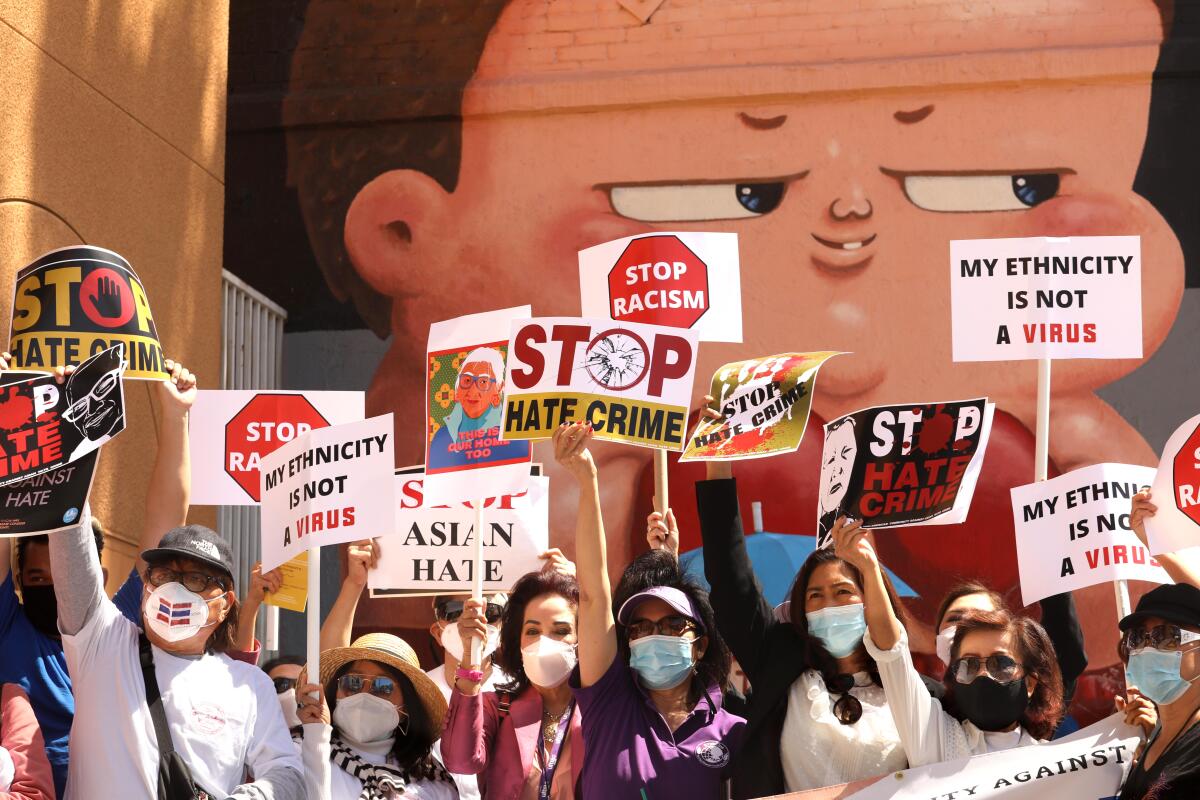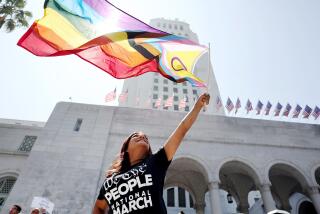Californians are finally acknowledging Asians are ‘frequently’ discriminated against, survey shows

- Share via
In a sign of shifting views on the Asian American experience in California, state residents are more willing to acknowledge that Asian Americans encounter discrimination, and Asian Americans are increasingly fearful of being victims of a hate crime, even more so than Black or Latino residents, according to a new statewide poll.
The recognition in the past year of growing animus toward Asian Americans is one of the key findings of the survey, which was commissioned by community groups and conducted in consultation with The Times. The shift in attitudes spans the time period since George Floyd’s death and the spate of attacks targeting Asian Americans nationwide.
Charlie Woo, chair of the Center for Asian Americans United for Self Empowerment, a group that helped commissioned the survey, said the poll’s data show Californians’ “profound shift” in attitude of the model minority myth. It also presents an opportunity to foster “ally-ship,” he added.
The poll found that the share of Californians who believe Asian Americans were “frequently or sometimes” discriminated against increased to 70%, 15 percentage points more than the level in February 2020. In February 2020, 63% of Asian Americans said they were discriminated against. Now, 79% believe so.
The increase is considered significant for a community that was once hesitant to say they faced unjust treatment. It is the biggest jump compared to white, Black and Latino Californians.
The survey also found that 73% of Asian American residents worry about being victims of physical violence or a hate crime. That’s higher than the share of Black and Latino residents, 61% and 58% respectively. Asian Americans also ranked highest among the other racial groups when asked if they feared being verbally abused, mocked or harassed in public and on social media.
Data show that this fear also weighs heavily on parents who are concerned their children will be bullied because of their ethnicity. However, only 29% of the state’s Asian Americans said their mental health was suffering because people look down on them for their race.
Although racism and violence targeted at Asian Americans isn’t a new phenomenon, the number of reported anti-Asian hate crimes has ballooned nationwide since the coronavirus shutdowns began last year. Thousands of Asian Americans have faced verbal harassment, physical assault or had their civil rights violated, according to a separate study released by Stop AAPI Hate.
“The publicity of the discrimination and the harassment, the physical violence, the emotional response from the Asian American community clearly has a big impact on the rest of California,” Woo said. “But this is not an Asian American problem alone. We need to bring in other communities to stand with us.”
Amid the explosion of hate, 88% of California’s Asian Americans said their ethnicity is important to their identity. That was an increase of 20 points since the question was asked in November. Ethnic identity was especially important to Asian American women and Asian Americans under the age of 50, according to Ben Winston, research director at Strategies 360, the polling and research firm that conducted the survey.
In 2020, 62% of Californians agreed that “in the future, people who share my background, values and culture will become more common and more accepted in America.” The share of Californians saying that dropped to 54% in the current poll. Across all groups, the state’s Asian Americans remained the most optimistic with 64%.
“Some of the recent events ... really changed some opinions in the community and maybe dampened some of that optimism,” Winston said.
The poll also showed views growing more optimistic regarding the COVID-19 pandemic. In the current poll, 19% of Californians said their personal financial situation had improved since the beginning of the pandemic. In July and November, only 10% agreed.
Although 67% of Californians said they are still worried that they or a family member could catch the coronavirus, that amount dropped 14 points since July. And 54% of Californians said they have received at least one dose of the vaccine. The state’s Asian Americans ranked first with 63%, followed by whites with 57%, Latinos with 46% and Black Californians with 39%.
Helen Torres, executive director of Hispanas Organized for Political Equality, another of the sponsoring organizations, said the data “dispels” stereotypes that Latinos don’t want the vaccine but also highlighted how a good chunk remain hesitant. As mass distribution sites shift to a more “micro-targeting” method, Torres said it will be up to community leaders and clinics to strategize how to best help convince those who are hesitant.
“It is not enough to say that we’re going to do something for the Latino community,” Torres said. “We have to make sure that we are addressing unequal systems exposed by this pandemic and investing in the research in reaching these hard-to-reach communities.”
Michael Lawson, president and CEO of the Los Angeles Urban League, the third sponsor of the poll, said the Black community’s “misunderstanding” of the importance of the vaccine was what struck him most. When his organization helped sponsor a vaccination site, the community showed enthusiasm, he said. But that eagerness wasn’t mirrored in the poll’s data.
“What you saw in this polling with respect to the concerns about the vaccination in the African American community that you still see a lot in the newspapers is more fluid than it is, than it looks on paper,” Lawson said. “There was very little debate about issues with respect to the vaccine, simply because of the voice they were hearing.”
More than 1,200 adults were interviewed online between April 16 and April 29 for the California Community Poll. The margin of sampling error for the full survey is 3 points.
More to Read
Sign up for Essential California
The most important California stories and recommendations in your inbox every morning.
You may occasionally receive promotional content from the Los Angeles Times.











